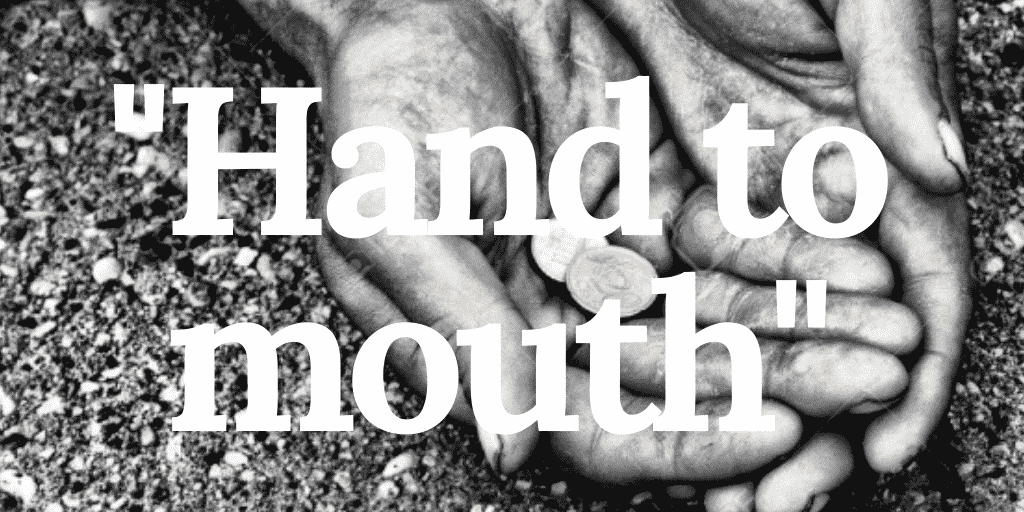“Hand to mouth” is an idiom that has been in use at least since the 1600s, and became more common in the 1930s during The Great Depression, when many people lived lives of deprivation.
This is one of the few idioms on our list that actually has nothing to do with Shakespeare, with nothing close appearing anywhere in his works.
Meaning of “Hand To Mouth”
An idiom is a group of words that has a figurative meaning, but which usually originated from a literal idea – in this case, living like wild animals, where food is usually consumed immediately when it is found, with little in the way of preservation.
“Hand to mouth” was used quite literally during a period of famine in Britain. At that time, there was so little food that whenever people found some form of sustenance, it went straight from their hands to their mouths as they didn’t dare save it for later in case they lost it.
The term is usually used in the phrases living hand to mouth and living from hand to mouth, meaning just existing from day to day or even from moment to moment. If someone lives from hand to mouth, they have no savings or reserves. In the most extreme circumstances of living hand to mouth, a person does not know from day to day whether they will have food to eat or a place to sleep. Most often, they are living just short of meeting all their financial obligations, and must economize and save money where they can.

“Hand to mouth”; a popular idiom in arts & literature
“Hand to Mouth” in Culture
The term “hand to mouth” is very popular among singers and other performers as a title for their works. There are some very famous people among them:
George Michael included the song “Hand to Mouth” in his debut solo album “Faith.” It begins:
“Jimmy Got Nothing made himself a name
With a gun that he polished for a rainy day
A smile and a quote from a vigilante movie
Our boy Jimmy just blew them all away
He said it made him crazy
25 years living hand to mouth
Hand to mouth, hand to mouth, hand to mouth”
Harold Lloyd’s 1919 film From Hand to Mouth is a 1919 American comedy silent film. This was the first film Lloyd made with frequent co-star (and future wife) Mildred Davis A print of the film survives in the film archive of the British Film Institute.
The American fiction writer, Paul Auster, named his 1997 autobiography “Hand to Mouth.”
Linda Tirado’s 2014 book, Hand to Mouth: Living in Bootstrap America attempts to answer many questions that middle and upper-class people have about the working poor, such as why they eat junk food, have so many kids, smoke, drink and do drugs. Tirado states that all the answers to these questions relate to a simple lack of money—for example, minimum wage and no benefits results in long shifts and constant commuting, which results in fast food consumption being the only viable option.
The Wider Use of “Hand to Mouth” in the Press
More than half of young Britons are living “hand to mouth”, according to a new survey.
The independent
The family lived hand to mouth and there were days when Ilangavon and his younger brother had gone to bed hungry.
The Weekend Leader
… he said: “We have to pay Cumbernauld to use their facilities – we really are living hand to mouth and if we didn’t have such a good president in Neil Anderson, I don’t know what we would have done.” The Kirkintilloch Herald
“It’s hand to mouth, hand to mouth,” said Kevin Donald, 34, a former security guard who now scrapes by cleaning car windows.
The Financial Times
So there is no hope that starving today will feed you tomorrow. In this recovery from the Great Recession, almost half of America is living hand to mouth.
New York Post




Leave a Reply
Want to join the discussion?Feel free to contribute!